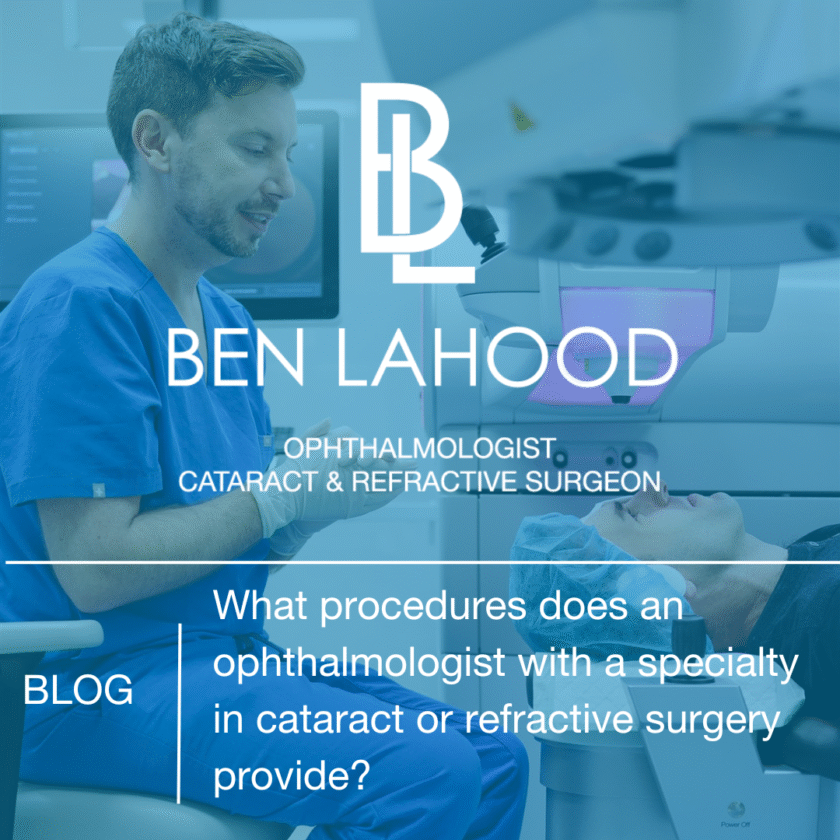
What procedures does an ophthalmologist with a specialty in cataract or refractive surgery provide?
Ophthalmologists who specialise in cataract and refractive surgery diagnose and treat a range of vision problems, often with surgical solutions. Depending on your needs, this may include cataract surgery, refractive lens exchange (RLE), laser vision correction, or other advanced treatments. Dr Ben LaHood is an ophthalmologist specialising in these procedures, offering personalised care to suit each patient’s eyes and lifestyle.
What Does an Ophthalmologist Do?
An ophthalmologist specialises in eye care, with extensive training in diagnosing and managing the eyes.
When they specialise in cataract and refractive surgery, they work with conditions that affect the clarity of vision, including the impacts of cataracts, short-sightedness, long-sightedness, astigmatism, and presbyopia.
Dr Ben LaHood undertakes detailed diagnostic testing and speaks to his patients about their visual goals to understand each patient’s desired outcome before recommending the most suitable procedure or course of action.
Cataract Surgery and Complex Cataract Cases
Cataracts cause the lens of the eye to become cloudy, which can make vision blurry or dull. Cataract surgery involves removing the cloudy lens and replacing it with a clear artificial lens, called an intraocular lens (IOL).
While many cataract surgeries are straightforward, some are more complex. Factors like dense cataracts, previous laser eye surgery, or existing astigmatism can make the procedure more complex. In all cases, Dr Ben LaHood undertakes rigorous diagnostic testing, careful planning to understand and recommend the best intraocular lenses for that patient to achieve the best possible visual outcome.
Refractive Lens Exchange (RLE)
Refractive Lens Exchange (RLE) is similar to cataract surgery but is usually performed to reduce the need for glasses in people who don’t yet have cataracts but want to achieve better vision and are not suited to laser vision correction.
Blended Vision
Blended vision is an approach Dr Ben LaHood may recommend for patients that are impacted by presbyopia, impacting near visual acuity as you age. One eye is adjusted for distance vision, while the other is set for near vision, enabling the patient to see well at all distances without the need for glasses or contact lenses.
Laser Vision Correction Options
Laser vision correction reshapes the cornea to help reduce or remove the need for glasses or contact lenses. Dr LaHood has expertise in the various procedures and technology used in laser vision correction procedures.
- SMILE®
- LASIK
- PRK
Your suitability for each option depends on a number of factors, like corneal thickness, eye health, and lifestyle.
Presbyopia and Other Age-Related Vision Concerns
Presbyopia is a natural part of ageing where the eye’s lens loses flexibility, making it harder to focus on near objects. Most people start to notice this around the age of 40, and it gradually progresses over time. While reading glasses are a common solution, options like refractive lens exchange or blended vision may be suitable for some individuals seeking longer-term solutions.
Dr Ben LaHood works closely with patients experiencing age-related vision concerns to provide customised treatment plans.
Understanding what you are best suited for
Your treatment starts with a detailed consultation using advanced imaging and diagnostic tools, as well as a personal consultation with Dr Ben LaHood. This helps him understand your eye health, discuss your options, and recommend the best approach for your goals.




